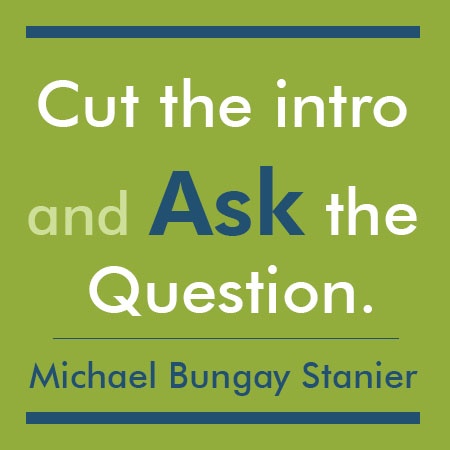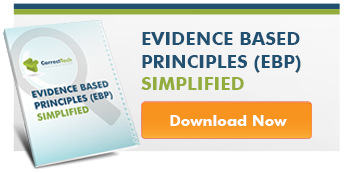When considering where to start formulating a practice model, I happened upon The Coaching Habit: Say Less, Ask More and Change the Way You Lead Forever. I love the title. It is so packed full of important concepts; coaching, habits, listening, asking, changing you, leadership and the future. Wow, if that’s the title, imagine all of the ideas covered in this brilliantly simple book by Michael Bungay Stanier. While in the past I’ve questioned the actual importance of coaching vs. the rise of the rhetoric and number of coaching books, after reading this book I am a believer. If you read one book about coaching, make it this one.
Read MorePut a Coaching Habit at the Heart of your Practice Model
Posted by Evan C. Crist, Psy.D. on 6/29/18 7:18 AM
Topics: Motivational Interviewing, client development, Listening Skills, The Coaching Habit, Michael Bungay Stanier, Community Corrections Client Services
The T's and C's : No Longer the ABC's in Community Corrections
Posted by Lisa Sayler on 4/26/18 12:21 PM
Community Corrections is Changing...Are You?
Change is hard. We expect our clients to change but when faced with change ourselves, we can often resist. We expect someone who has lived a certain way for 20, 30, 40+ years to make abrupt changes but when we give up sweets and our colleague brings donuts in, we gobble them down and vow that was the last time. We get a speeding ticket and vow to not speed anymore but once the initial sting has worn off, we look down and notice we are going 40 in a 30 and didn’t even realize it. It’s so much easier for people to change when it’s not us. It takes a lot of practice, new habits and even failure, to change. Sure, there is a valid difference, if an offender doesn’t change criminal behavior, there are serious consequences to their freedom, not just to their waistline or pocket book. But if those consequences were all it took; community corrections might not exist.
Community Corrections is changing. The change has been in the works ever since the early “what works” and “EBP” research pointed us to new approaches. What is different now is the change is hitting closer to home to the daily routines, decision making and programming. We know this through our conversations with practitioners all around the country and many in some of the most progressive states in community corrections, who are looking for support in meeting new and existing requirements from oversight agencies. While many in the field are excited about the changes, others are left feeling anxious, frustrated and resistant to change. Just like many of our clients feel upon entering a program. While it is easier not to change our own practices, we must continue to try new approaches and work to improve long term results. It doesn’t mean we don’t hold our clients accountable, it means we expand and adapt our approach and learn we have other tools in our toolbelt. People, even community correction professionals, must be held accountable to change in ways that move towards improved results.
Read MoreTopics: Community Corrections, Evidence Based Practices, Motivational Interviewing, Community Corrections Professional, Change, what works, responsivity, impact sessions, intrinsic motivation, client development
Is Software the Key to EBP?
Posted by Eric Tumperi on 11/5/15 1:00 PM
The Foundational Roles of Technology in Agency EBP Work
For evidence based practices to come alive, we must measure everything… and not using our fingers and toes!
It All Started with Looking For A Better Way…
Ten years ago, there was little reason to focus on the software features needed to design an EBP software system. Early in the EBP movement, agencies’ pursuit of EBP was tied to “validated risk assessments” and new case management disciplines as characterized in Motivational Interviewing.[i] In other words, there was little impact on legacy case management systems. In fact, new automation was centered on the emerging risk assessment tools.
Today, with rising expectations from funding agencies, courts, and our community stakeholders to show progress in EBP, measure outcomes, and determine what works with our own client populations, the rules have changed. There is fresh impetus and opportunity to reconsider what it means to have a modern-day case management system for the residential and non-residential community corrections field. After all, legislators and community stakeholders have been convinced of the merits of the science and strategy behind investing in offender rehabilitation instead of incarceration. The challenge for the coming decade is to show real results and make meaningful efforts to learn about outcomes, apply new knowledge, and create a system of people, processes and data that brings the promise of EBP to life.
Read MoreTopics: Community Corrections, Evidence Based Practices, Policy, Motivational Interviewing, Change
Subscribe To Our Blog
Recent Posts
Posts by Topic
- Community Corrections (61)
- Evidence Based Practices (44)
- Community Corrections Professional (23)
- Software (15)
- Practices (12)
- Change (11)
- Technology (10)
- Risk Principle (8)
- reentry (8)
- probation staff (7)
- EBP (6)
- Outcomes (6)
- client development (6)
- client needs and values (6)
- coaching community corrections clients (6)
- Assessment (5)
- Community (5)
- Developing a practice model (5)
- Justice-Involved Clients (5)
- Remote work (5)
- The Coaching Habit (5)
- parole (5)
- risk (5)
- tele-supervision (5)
- tele-work (5)
- Community Engagement (4)
- Evan C. Crist (4)
- Community Corrections Client Services (3)
- Criminal Justice Reform (3)
- Implementation (3)
- Listening Skills (3)
- Motivational Interviewing (3)
- Policy (3)
- Positive Reinforcement (3)
- Practice Models (3)
- high risk client (3)
- reaching clients emotions (3)
- responsivity (3)
- Addiction (2)
- BOP (2)
- Conferences (2)
- ICCA (2)
- Management (2)
- Michael Bungay Stanier (2)
- Relapse Prevention (2)
- halfway house (2)
- jic (2)
- principles (2)
- procedures (2)
- program results (2)
- APPA (1)
- Appreciative Thinking (1)
- Brian Lovins (1)
- COVID-10 (1)
- Community Connection (1)
- Coronavirus (1)
- Crisis (1)
- Customer Service (1)
- Data Management (1)
- Fidelity (1)
- ICCA Seattle (1)
- Juvenile Corrections (1)
- Leadership (1)
- Monitor History (1)
- Opioid Addiction (1)
- Opioid Crisis (1)
- Orange is the New Black (1)
- Program Data (1)
- Reforms (1)
- Relapse (1)
- Second Chances (1)
- Switch by the Heath Brothers (1)
- Treatment (1)
- drug testing (1)
- going paperless (1)
- govcio outlook (1)
- impact sessions (1)
- innovation (1)
- intrinsic motivation (1)
- justice reinvestment (1)
- marijuana testing (1)
- money savings (1)
- opiod testing (1)
- paperless office (1)
- purpose (1)
- remote working (1)
- resources (1)
- sanction (1)
- staff productivity (1)
- technology solutions provider (1)
- the awe question (1)
- what works (1)
- what's on your heart (1)
- work from home (1)





